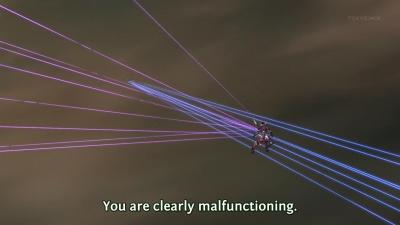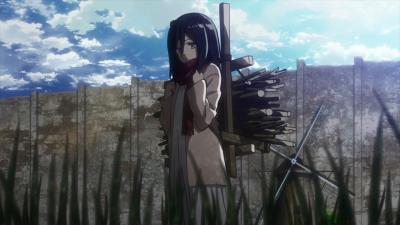I was ready to absolutely fall in love with this movie after his mother’s sacrifice. There was a great mystery behind why his family became so divided, why his eye matters so much, and why his mother had fled. It had all of the elements of a great story waiting to be told: a great thematic setup, a wondrous artistic backdrop and a clear end goal to work towards, but Kubo and the Two Strings complete fumbles it. It’s shocking to me how poorly written the middle and end sections of this movie are when the beginning is so well done.
An manga/anime blog with no sense of timeliness
Author Archives: decadyn
Unalaq’s lack of character motivation or how I would have changed his character
One of the most widely agreed flaws of Korra season 2 is Unalaq, specifically what on Earth his goal is. His character motivation is constantly changing throughout the season which makes it hard to understand what is at stake for him and why he’s a threat to our protagonists. Specifically, his end goal of bringing ten thousand years of darkness is entirely a non sequitur from the rest of his characterization.
Gatchaman Crowds is just Power Rangers
Obviously Gatchaman Crowds was based off Gatchaman which was a super sentai-esque show from the 80s but that’s not what I’m talking about. Thematic, many like Bobduh, and others claim that because Gatchaman Crowds touches on so many different complex issues like crowd sourcing, the definition of heroism, the structure of society, and governance; that this demonstrates story depth. I disagree, Gatchaman Crowds is just Power Rangers thematically in that it uses these complex subjects as a cover for what is ultimately a very simple show. Sure, the Power Rangers dealt with issues of self identity, the animal guises were sometimes used for environmental messages, and the various spinoffs probably had interesting ideas because of their various settings. But all of these different changes in settings and costumes doesn’t change the fact that the main message of Power Rangers was “friendships are awesome and you should think positive!” which is the exact same message of Gatchaman Crowds. Obviously Gatchaman Crowds has better writing but my point is that all of the details that Gatchaman Crowd fans latch on to, are peripheral to the story, and are given far too much credit than is due. Continue reading
A short blurb on Watamote’s humor
Continue reading
Sunday Without God is the last straw

You aren’t allowed to have a character relationship go from milliseconds away from blasting her brains out to…
I gave “Sunday without God” the three episode test a few weeks back and am only now writing about it. For the sake of my sanity, I’m reducing my standard to a one episode test from now on. Not that Sunday without God is a particular terrible show, its about averagely terrible in that its full of shitty anime cliches and terrible gimmicky writing. I’m lowering my tolerance because I lose so much faith in the anime community by watching these terrible shows and it pains me to see anime fans accept and even praise this drivel. Nothing but praise from the reddit anime subreddit, Nothing but praise from so many anime bloggers.
Its just annoys me to see the low standards anime fans have and it really makes me cynical about the anime community by reading posts about these shows. Obviously, this is just my opinion and there is nothing I can do to prove that a show is objectively bad or change anyone’s opinions. I’m sure, someone out there feels the same way about what I enjoy. But on a personal level, its not worth the emotional energy to deal with having to watch shows I consider terrible and then having to read praise for said show from a community and individuals that I otherwise like and identify with. From now on, as soon as I think a show is terrible, or I think the author doesn’t know what he’s doing, I’m dropping the show then and there. Continue reading
Gargantia, A big long stupid ending.
A big trend in Hollywood blockbusters in the past decade is the having a ending be one long full scaled battle scene with explosions and two sides charging at each other that usually ends with nothing really being resolved besides defeating the enemy. It certainly wasn’t the first movie to do it, but The Lord of the Rings trilogy certainly helped start the trend of big stupid action finales. And unlike Lord of the Rings, these copy cats don’t realize that action scenes are supposed to be a vehicle for resolving character development. I like action as much as the next guy but I like action better if I care about the characters doing the action, and if I care about why they are doing it. It helps slows the arms race of needing an enormous budget to hire thousands of cgi animators to render 30 minutes of flashing lights. Good writing is cheaper than choreographing a good fight, and contributes more to my overall enjoyment.
This should have been the case with Gargantia, its focus on character development should have overwhelmed its minor flaws. If I cared more about the characters, I would care less about how ugly the mecha designs are. I would care less about how its combat systems make little to no sense and are confusing to watch. I would care less about how if Striker was able to pilot almost as well as a human pilot by studying pilot logs, if so why hasn’t the empire just adopted AI fighters?
The obvious answer is the biosync with the pilot gives superior fighting ability, but that ability was obviously pulled out of the writer’s ass to answer this question; they should have introduced it in the first episode to set it up. These are all minor quibbles but this is what happens when the script doesn’t make the audience care about the characters. Once the audience stops suspending their disbelief of the absurd assumptions necessary for the story to work, they start seeing flaws that they would ordinarily forgive and forget. Continue reading
On the Characters in Aku no Hana
This post is in response to the podcast comments on Aku no Hana over at Project Haruhi, check them out, its mildly entertaining stuff.
Although I haven’t read the manga, I think you guys are totally off base on Aku no Hana.
1. Nakamura is not an inner demon of Kasuga’s psyche.
Nakamura identifies herself by wanting to be the antithesis of what she thinks the mainstream represents. But she isn’t as strong like Kasuga thinks or as evil as some audiences think. She puts like a front of being aloof while hating herself for not having the power to change anything. She’s in fact relays on Kasuga to do everything for her since she herself is a coward. She keeps referring to Kasuga as a “real deviant” and how happy she is to meet a “real deviant” because she herself doesn’t have the confidence to put herself out as such.
That’s why she gets him to wear other’s clothes, asks him to carry her over the mountains, and gets him to destroy the classroom; she’s too scared to do it alone. She thinks Kasuga is a kindred spirit so she’s projecting her own desires on him simply because he’s the only one she’s seen who has done something out of the norm (stealing Saeki’s clothes). She’s looking for validation of her own feelings by trying to find another, which is the show demonstrating the irony of her rebellion against the masses but wanting others to confirm her uniqueness. Kasuga thinks of her as some great evil and deviant but she’s just a girl wanting validation. You can see this in episode 10 after she feels betrayed by Kasuga; she tries to run away but trips and falls. She’s as vulnerable as our other two main characters. Continue reading
I fucking hate the directing in Attack on Titan
Attack on Titan is one of the most successful manga of this half decade, and for good reason. Its got great action sequences that are cleverly created from fantasy technology and the author does a good job of showing the scope of his world to the audience. The art itself is blotchy and inconsistent but Isayama Hajime does a good job drawing motion so even if the art is mediocre, you can always tell whats going on during action sequences (unlike say, D. Grayman). Isayama clearly put a lot of time in thinking about the world in which his story takes place because he justifies the existence and logic of 3d maneuvering gear, why the walls are structured like they are, and the division of the military forces thoroughly. He doesn’t fall into the pit-trap that most fantasy authors fall into: which is just because its fantasy, doesn’t mean you can throw logic out of the window. Isayama does a good job justifying his world, and I love the concept of the 3d maneuvering gear.
But when it comes to the dialogue, especially dialogue that involves politics, he fucking sucks. Any character that opposes the obviously correct position of our heroes gets the overdramatic “I am only here to represent this emotion!!!” kind of dialogue that is delivered in full caps. The effect of this type of unsubtle writing isn’t as annoying if you are reading the manga because the reader isn’t forced to hear the histrionics aloud but that’s not the case with animation, where the audience processes the words, music, and tone, all at the pace of what the director wants. And unfortunately for me, the director of Attack of Titan decided to take the already hyper emotional dialogue of the manga, and turn the dial to eleven by adding speedlines everywhere.

Seriously fuck speedlines
Then the director makes things even worse by making his actors shout every line without changing pitch. I understand that living in a world where giant humanoid creatures are eating your friends is a justifiable reason to yell, but it doesn’t mean you have to break down and do the “WE’RE ALL GOING TO DIE!” speech every single episode. The audience already knows that, we’ve established that in the first episode, stop beating us over the head with it. Continue reading
I can’t help but love Chihayafuru.
Over the last 5 months I’ve had an obsession with Chihayafuru. I’ve scoured every blog that does episodic reviews of the show. I’ve read every single post on /a/ about it using http://archive.foolz.us/a. I’ve listened to the soundtrack countless times. And the experience of Chihayafuru still remains so emotionally vivid to me. I’m tearing up right now by just recalling my recollections of Chihayafuru.
But why is Chihayafuru so good? Moesucks and Scamp are right that Chihayafuru pulls no punches; that it follows the shoujo heart-string plucking formula to a tee with a healthy dosage of Shounen sports tropes thrown in. The initial premise sounds absurd; how can a show about competitive poetry memorization eypgtian ratscrew make for an interesting show? Yet the show works for three reasons: its characters development, its music, and the damn good direction. This post will be updated, it’s late and want to sleep.


![[Commie] Watashi ga Motenai no wa Dou Kangaete mo Omaera ga Warui! - 03 [85997C86].mkv_snapshot_05.43_[2013.09.02_08.24.09]](https://latereaction.wordpress.com/wp-content/uploads/2013/09/commie-watashi-ga-motenai-no-wa-dou-kangaete-mo-omaera-ga-warui-03-85997c86-mkv_snapshot_05-43_2013-09-02_08-24-09.jpg?w=400&h=225)
![[Commie] Watashi ga Motenai no wa Dou Kangaete mo Omaera ga Warui! - 03 [85997C86].mkv_snapshot_05.44_[2013.09.02_08.40.59]](https://latereaction.wordpress.com/wp-content/uploads/2013/09/commie-watashi-ga-motenai-no-wa-dou-kangaete-mo-omaera-ga-warui-03-85997c86-mkv_snapshot_05-44_2013-09-02_08-40-59.jpg?w=400&h=225)
![[Commie] Watashi ga Motenai no wa Dou Kangaete mo Omaera ga Warui! - 03 [85997C86].mkv_snapshot_05.47_[2013.09.02_08.24.15]](https://latereaction.wordpress.com/wp-content/uploads/2013/09/commie-watashi-ga-motenai-no-wa-dou-kangaete-mo-omaera-ga-warui-03-85997c86-mkv_snapshot_05-47_2013-09-02_08-24-15.jpg?w=400&h=225)


![[gg]_Aku_no_Hana_-_10_[FCBEF269].mkv_snapshot_21.57_[2013.06.17_18.21.19]](https://latereaction.wordpress.com/wp-content/uploads/2013/06/gg_aku_no_hana_-_10_fcbef269-mkv_snapshot_21-57_2013-06-17_18-21-19.jpg?w=400&h=225)
